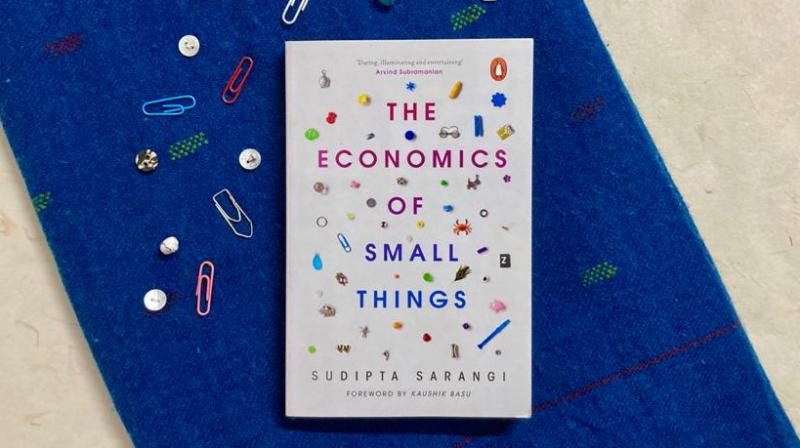Clever treatise marries economics, storytelling
Dr Sudipta Sarangi weaves anecdotes and economic incidents with fascinating studies in her book 'The Economics of Small Things'

What does economics have to do with how I protect my shoes from thieves outside a temple, or with the “atithi devo bhava” motto, or whether to wear a seatbelt versus solely relying on a prayer to keep me safe while driving? Virginia Tech’s Dr Sudipta Sarangi’s book The Economics of Small Things entertains us with often witty anecdotes as he brings out connections between economics and everyday behavioural choices. Delightful incidents from films, music industry, social media, history, and author’s personal experiences intersect in this book to reveal how laws of economics govern social norms and preferences.
Mahatma Gandhi’s economically non-defensible complaint against the railways makes for an interesting case to talk about economic motives behind pricing of goods. Laws of demand explain why the best alphonso mangoes get exported from India and become cheaper abroad. The financial success of the music company T-series and the profitable placement of breakfast cereals in a grocery store, demonstrate how you can benefit from writing a resume that uses the concept of product differentiation. Managers can learn team building skills from a gang of Scandivanian shoe stealers via the complementary goods theory. The story of Pied Piper of Hamelin is analyzed using game theory to prove that it is wise to not keep your work skills a secret if you want to be paid for them. I wish I had such an easy to read and humourous collection of examples to relate complicated economic theories with, when I was studying for my Bachelors in Economics.
Dr Sarangi weaves anecdotes, recent and historical economic incidents with fascinating studies by economists, including Nobel laureates, to create stories that elucidate the reasoning behind human exploits. To give an example, here is an excerpt from the chapter “A Tale of Two Bounties” — Apparently, worried about the number of cobras in Delhi, the British colonial government had started offering a bounty to anyone who turned in a dead cobra. The story goes that in response to this, some smart people started farming cobras. As a result, the government finally had to kill the programme. The German economist, Horst Siebert, is supposed to have coined the term ‘Cobra Effect’ to describe the phenomenon in a book where he provided numerous examples of such perverse incentives. The author describes various riveting incidents to interpret that incentives impact human behaviour but large incentives like bounties can distort human behavior. Hence nation states don’t deal with hostage takers or protect falling banks to not encourage more hostage taking or risky financial practices.
Economics of Small Things comprises of chapters that don’t have to be read in any particular order. The flexibility allows one to read the book in small chunks over time or smile through it in one go, like I did. Professor Sarangi’s book tells tales of everyday economics, in a style that makes one reminiscent of long conversations with friends over endless cups of tea. The book has elements of travel cum memoir, the author drawing upon personal encounters, funny anecdotes, and travels to show how the world can be explored through the spectrum of economics. This excerpt is from the author’s time in Istanbul for the Fourth World Congress of the Game Theory Society aka Game Theory Olympics in the chapter “Palaces, Raki and Game Theory” — Drinking Raki usually requires a group of good friends and plenty of food, especially cheese (peynir in Turkish) and kebabs, and the circle that is formed is the equivalent of the Indian adda. So gather up a bunch of friends, order plenty of food, eat a bit and raise a toast (serefe in Turkish) and take a sip; no bottoms up here. If you are looking to generate some sure-fire table talk, this book is brimming with tales, incidents, events and phenomenon — a conversation starter, its engaging stories and facts make it a delightful read for fiction and non-fiction lovers. Dr Sarangi teaches a popular course, “Economic Puzzles in History, Literature & Movies” at Virginia Tech.
Being easy to relate to, The Economics of Small Things appeals to both young minds like my tween son who could connect with many concepts including that of “the free rider”, and to specialists like Kaushik Basu, who wrote the foreword. Cornell University professor, Kaushik Basu was formerly the chief economist at the World Bank and chief economic advisor to the Government of India.
The word, economics, is synonymous with complex and difficult to grasp terms such as income, inflation and interest rates. This is a rare story-telling from an economist. It builds a lot of anticipation as chapters progress, hence it could have ended with a crescendo rather than a summation. If economics were a stand-up comedian, it would become The Economics of Small Things.

